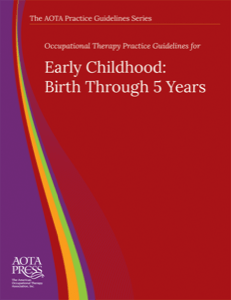Abstract
During early childhood, most children in the United States achieve their developmental milestones; however, about 1 of every 6 children will have a developmental disability or disabling behavioral problem before age 18. Less than half are identified during early childhood. Occupational therapists and occupational therapy assistants work with families and caregivers to support and enhance young children's ability to engage in occupations appropriate to their age. This is a critical time not only to educate children but to also provide them with support to participate fully throughout their lives.
This publication addresses occupational therapy practice for children birth to age 5 years, including early intervention and preschool practice. It defines the occupational therapy domain, process, and intervention that occur within the boundaries of acceptable practice. Topics include prematurity, ASDs, feeding disorders, obesity, the NICU, and cerebral palsy, as well as motor and praxis skills, sensory-perceptual skills, emotional regulation, cognitive skills, and communication and social skills. Interventions discussed include those promoting social-emotional development; for feeding, eating, and swallowing; for improving cognitive development; for promoting motor performance; and for service delivery in early childhood. Appendices contain additional information relating to early childhood practice, coding for intervention and evaluations, funding sources affecting early childhood settings, and methodologies used in the evidence-based literature review.
Details
Table of Contents
Occupational Therapy Practice Guidelines for Early Childhood: Birth through 5 Years
-
Front Matter
ii3

-
Introduction
110

- Overview of Early Childhood 716
- Occupational Therapy Process for Children Birth Through 5 Years 1120
- Occupational Therapy Intervention and Evidence-Based Practice in Early Childhood 3544
- Summary and Implications for Occupational Therapy Practice 5160
-
Appendix A. Preparation and Qualifications of Occupational Therapists and Occupational Therapy Assistants
5968

-
Appendix B. Selected Current Procedural Terminology™ (CPT) Codes for Occupational Therapy Evaluations andInterventions for YoungChildren (Birth–5 Years)
6170

-
Appendix C. Evidence-Based Practice
6574

-
Appendix D. Evidence Tables
7180

-
References
127136

- Subject Index 146155
- Citation Index 151160
